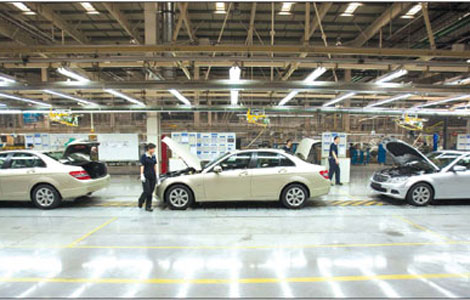Editorials
Migrant workers' hukou
Updated: 2011-03-07 08:06
(China Daily)
The nation's legislators and their political advisors have brought the issue of migrant workers to the table for discussion at the National People's Congress and the Chinese People's Political Consultative Conference (CPPCC) annual sessions.
Last week, Chi Fulin, a member of the CPPCC, proposed a hard and fast goal: All small and medium-sized cities should grant migrant workers a hukou, or a permanent residency permit, within three years, and large cities follow suit after that.
Chi's proposal is not exactly new, but he has come up with a time frame.
Granting migrant workers rights in cities could encourage them to spend more, fulfilling the goal of the central government to raise consumption.
The hukou system has served to segregate the rural and the urban populations in geographical terms and more fundamentally, in social, economic and political terms.
This labor pool was created when the nation started its economic reforms. Migrant workers have provided the sweat, blood and muscle to make the nation what it is today. The farmers-turned-workers have made possible the rapid growth of the new skylines of the cities, as well as the high-speed trains, subways and road network linking this vast country.
However, their migrant status creates hardships and loneliness for the individual workers and their families and deprives them of health, retirement and unemployment benefits.
The strategies some cities have devised can certainly be seen as a welcome sign to address this issue.
Shanghai and a number of other cities have started a "points system" to grant "well-qualified" migrant workers permanent residency. But to many migrants' disappointment, the eligibility requirements are so stringent that less than 0.1 percent of migrants will qualify to apply.
This is not surprising. With local government financing social security, social welfare and social relief, it is unfeasible for city governments to provide all migrant workers with social benefits and public services in the same way as their urban counterparts within a short time frame.
Last year Chengdu, Sichuan province made a bolder step. It released a working plan on the free migration of its residents between urban and rural areas starting 2012.
The "points system" that handpicks "top" migrants - those well endowed with financial assets, human capital or both - will only encourage cities to cream off the 'best' without addressing the general issues that affect the livelihood of millions.
It is an issue the government should address sooner or later. At 150 million strong, the migrant workers will continue to play a vital role in China's future.
(China Daily 03/07/2011 page9)
E-paper

Factory fever
Despite auto manufacturing bubble scare, car giants gear up expansion of factories.
Dressed for success
Fabric of change
High spirits
Specials

Earthquake Hits Japan
A massive 8.8 magnitude quake hit the northeast coast of Japan on March 11,2011.

NPC & CPPCC sessions
Lawmakers and political advisers gather in Beijing to discuss major issues.

Slide: Japan quake
Devastating earthquake and tsunami left millions without water, electricity, homes or heat.
